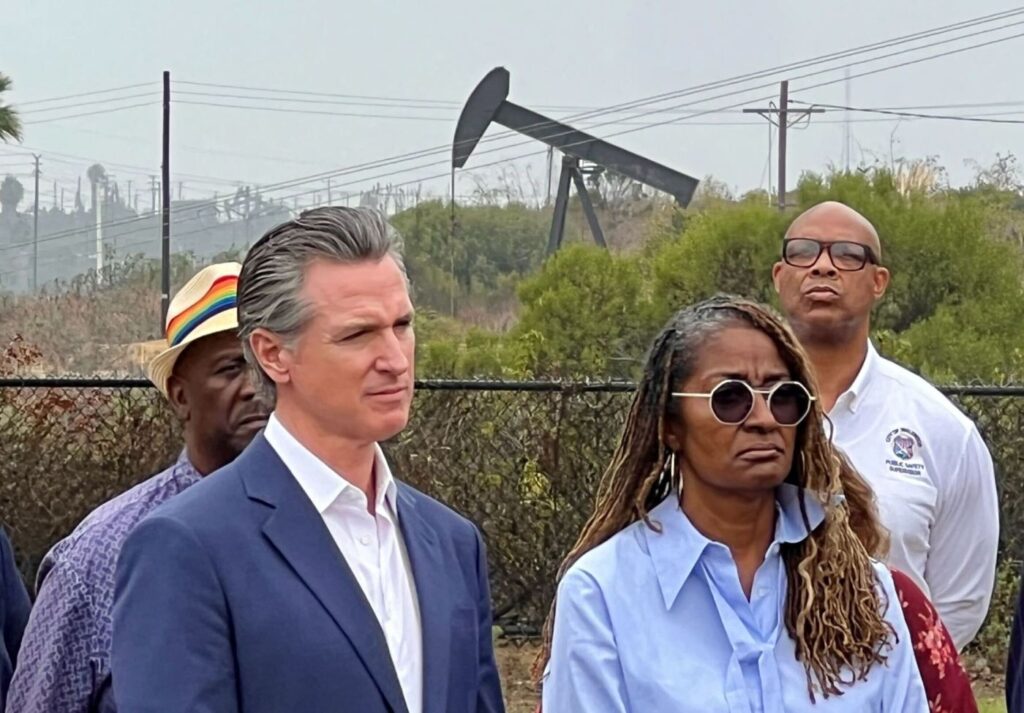
California Gov. Gavin Newsom visited Los Angeles on Wednesday, Sept. 25, to sign three pieces of legislation aimed at allowing local governments to restrict oil drilling, address idle oil wells and increase community health protections.
Newsom gathered with other elected officials, including LA County Supervisor Holly Mitchell, and community advocates at the Kenneth Hahn Soccer Fields — directly abutted by the Inglewood Oil Field — in Los Angeles to sign the bills into law.
The first, Assembly Bill 3233 — authored by Assemblymember Dawn Addis, D-Morro Bay, and sponsored by the Center for Biological Diversity — will authorize local governments to limit or prohibit oil and gas operations within their jurisdiction, a power previously reserved for the state’s oil and gas supervisor.
AB 3233 is intended to allow cities to take action against oil operations that pose a threat to public health, wildlife and the environment.
“AB 3233 (gives) clear direction to cities and municipalities that they can act to protect their communities,” Martha Dina Argüello, executive director of Physicians for Social Responsibility, said during Wednesday’s press conference. “We will be there watch dogging.”
Another piece of legislation signed by the governor Wednesday, AB 1866, will require oil operators to plug an estimated 40,000 idle oil wells throughout the state over the next decade — with priority given to wells within 3,200 feet of local communities.
Without changes to the existing law, according to a press release from the office of Assemblymember Gregg Hart — the bill’s author — it would take around 75 to 100 years to plug the majority of California’s idle wells.
“Existing law requires operators to submit an Idle Well Management Plan and plug between 4-6% of their oldest idle oil wells per year,” the March press release said. “Operators also have the option to pay as little as $150 per well in order to avoid submitting a plan. This program is not working as intended.”
The number of idle wells, in fact, actually increased from 2018 to 2021, the news release said, from 29,000 to 38,000 — which, if abandoned by oil operators, could end cost upward of $10 billion for the state to plug and remediate.
Idle oil wells, according to the Center for Biological Diversity, can pose a serious threat to both public health and the environment.
A Sierra Club report released last year, for example, found that about two-thirds of the state’s unplugged wells are leaking methane — a super pollutant with worse long-term effects on the climate than carbon dioxide.
“Wells that leak methane likely also leak other dangerous air pollutants like benzene and volatile organic compounds,” the Center for Biological Diversity said. “Idle wells can also act as pathways for contaminants to move into groundwater, especially as wells get older.”
AB 1866 would require the state’s largest oil operators to plug 20% of their idle wells this year alone — while medium and small operators would have to plug 15% and 10% of their idle wells, respectively.
The law will also eliminate the option for oil operators to pay an idle well fee — which, under previous law, was as low as $150 per well in some cases — to avoid plugging the wells.
About 5,000 wells throughout the state have been orphaned, Newsom said, meaning there is no associated oil company to hold accountable for their plugging and permanent abandonment. That burden now lies on the backs of the state and its taxpayers, Newsom said.
California has already put aside about $160 million to begin permanently plugging those 5,000 wells — about $60 million of which came from the federal government.
“It is absolutely right to hold the oil companies themselves accountable to address the issues around idle wells,” Newsom said Wednesday, “before they become orphaned and they have no liability and we have no recourse — that’s another central part of the bill package we’re signing here today.”
The third law, AB 2716, specifically targets low-oil operations within the Inglewood Oil Field, which is located within the Baldwin Hills Conservancy.
That bill will impose a $10,000 monthly penalty against oil companies responsible for those wells until they’re permanently plugged. Funds recouped from those penalties, according to a news release from Newsom’s office on Wednesday, will pay for community projects, including parks.
“The Inglewood Oil Field is the largest urban oil field in our state,” Assemblymember Isaac Bryan, the bill’s author, said in the news release. “Today, with (Newsom’s) signature, we will finally shut it down and establish the state’s first repair fund for the frontline communities who have been organizing for years to be seen, heard, and protected.”
